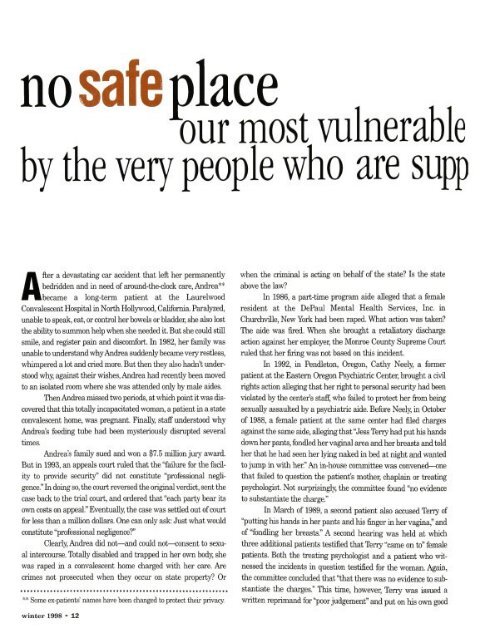women histories, incest sexual abuse. institutionalized. But what if ...
women histories, incest sexual abuse. institutionalized. But what if ...
women histories, incest sexual abuse. institutionalized. But what if ...
Create successful ePaper yourself
Turn your PDF publications into a flip-book with our unique Google optimized e-Paper software.
no safe place f 1,<br />
our most vulnerable<br />
by the very people who are supp<br />
After a devastating car accident that left her permanently<br />
bedridden and in need of around-the-clock care, Andrea**<br />
became a long-term patient at the Laurelwood<br />
Convalescent Hospital in North Hollywood, Cal<strong>if</strong>ornia. Paralyzed,<br />
unable to speak, eat, or control her bowels or bladder, she also lost<br />
the ability to summon help when she needed it. <strong>But</strong> she could still<br />
smile, and register pain and discomfort. In 1982, her family was<br />
unable to understand why Andrea suddenly became very restless,<br />
whimpered a lot and cried more. <strong>But</strong> then they also hadn't understood<br />
why, against their wishes, Andrea had recently been moved<br />
to an isolated room where she was attended only by male aides.<br />
Then Andrea missed two periods, at which point it was discovered<br />
that this totally incapacitated woman, a patient in a state<br />
convalescent home, was pregnant. Finally, staff understood why<br />
Andrea's feeding tube had been mysteriously disrupted several<br />
times.<br />
Andrea's family sued and won a $7.5 million jury award.<br />
<strong>But</strong> in 1993, an appeals court ruled that the "failure for the facility<br />
to provide security" did not constitute "professional negligence."<br />
In doing so, the court reversed the original verdict, sent the<br />
case back to the trial court, and ordered that "each party bear its<br />
own costs on appeal." Eventually, the case was settled out of court<br />
for less than a million dollars. One can only ask: Just <strong>what</strong> would<br />
constitute "professional negligence?"<br />
Clearly, Andrea did not—and could not—consent to <strong>sexual</strong><br />
intercourse. Totally disabled and trapped in her own body, she<br />
was raped in a convalescent home charged with her care. Are<br />
crimes not prosecuted when they occur on state property? Or<br />
** Some ex-patients' names have been changed to protect their privacy.<br />
winter 1998 - 12<br />
when the criminal is acting on behalf of the state? Is the state<br />
above the law?<br />
In 1986, a part-time program aide alleged that a female<br />
resident at the DePaul Mental Health Services, Inc. in<br />
Churchville, New York had been raped. What action was taken?<br />
The aide was fired. When she brought a retaliatory discharge<br />
action against her employer, the Monroe County Supreme Court<br />
ruled that her firing was not based on this incident.<br />
In 1992, in Pendleton, Oregon, Cathy Neely, a former<br />
patient at the Eastern Oregon Psychiatric Center, brought a civil<br />
rights action alleging that her right to personal security had been<br />
violated by the center's staff, who failed to protect her from being<br />
<strong>sexual</strong>ly assaulted by a psychiatric aide. Before Neely, in October<br />
of 1988, a female patient at the same center had filed charges<br />
against the same aide, alleging that "Jess Terry had put his hands<br />
down her pants, fondled her vaginal area and her breasts and told<br />
her that he had seen her lying naked in bed at night and wanted<br />
to jump in with her." An in-house committee was convened—one<br />
that failed to question the patient's mother, chaplain or treating<br />
psychologist. Not surprisingly, the committee found "no evidence<br />
to substantiate the charge."<br />
In March of 1989, a second patient also accused Terry of<br />
"putting his hands in her pants and his finger in her vagina," and<br />
of "fondling her breasts." A second hearing was held at which<br />
three additional patients test<strong>if</strong>ied that Terry "came on to" female<br />
patients. Both the treating psychologist and a patient who witnessed<br />
the incidents in question test<strong>if</strong>ied for the woman. Again,<br />
the committee concluded that "that there was no evidence to substantiate<br />
the charges." This time, however, Terry was issued a<br />
written reprimand for "poor judgement" and put on his own good

















